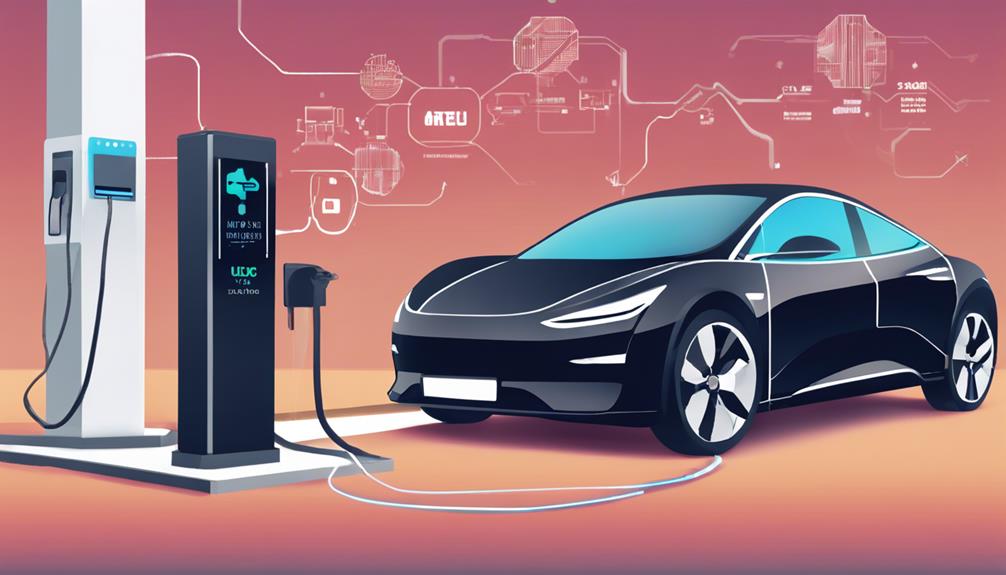Maximize your electric vehicles with IoT technology for peak performance. Real-time data collection tracks key metrics and drives operational efficiency. Proactive maintenance detection guarantees peak vehicle health. Energy management optimizes consumption and integrates renewable sources. Fleet monitoring reduces fuel consumption and enhances safety. Battery management prolongs lifespan and maximizes performance. Enjoy tailored charging schedules and user-friendly interfaces for personalized experiences. Data-driven analytics offer insights for cost efficiency and reduced downtime. Explore how IoT revolutionizes electric vehicle efficiency and user satisfaction.
Key Takeaways
- Real-time data collection for performance tracking.
- Predictive maintenance alerts for issue prevention.
- Energy optimization and smart charging systems.
- Fleet management through real-time monitoring.
- Battery health monitoring for longevity.
Vehicle Connectivity
Vehicle connectivity in the EV industry enables real-time data collection on performance parameters such as voltage, current, and temperature, revolutionizing how electric vehicles are monitored and maintained. Connectivity analysis allows for precise performance tracking, providing valuable insights into the operational efficiency of electric vehicles. By constantly monitoring these key metrics, manufacturers and users can optimize driving patterns, battery usage, and charging habits for enhanced performance and extended battery life.
The ability to track performance in real-time opens up a world of possibilities for improving the overall driving experience and efficiency of electric vehicles. Through connectivity solutions, drivers can receive instant feedback on their driving behaviors, energy consumption, and overall vehicle health. This data-driven approach not only enhances the driving experience but also streamlines maintenance processes by enabling proactive identification of potential issues before they escalate. As a result, connectivity in the EV industry is not just about data collection; it's about empowering users with the information needed to make informed decisions for a more efficient and enjoyable electric vehicle ownership experience.
Predictive Maintenance
With the integration of IoT technology, predictive maintenance in electric vehicles revolutionizes the way potential issues are detected and addressed before they impact vehicle performance. Maintenance alerts generated through real-time data collection on vehicle performance parameters enable proactive identification and resolution of issues, ultimately reducing repair costs and minimizing downtime. By leveraging advanced analytics and machine learning algorithms, predictive maintenance in EVs can predict maintenance needs, optimizing operational efficiency and enhancing component longevity. This proactive approach not only extends the lifespan of vehicle components but also guarantees peak performance by addressing maintenance requirements before they escalate. The utilization of IoT for predictive maintenance enhances safety, reliability, and cost-effectiveness in electric vehicles, providing a holistic solution that prioritizes efficiency and effectiveness. Embracing predictive maintenance through IoT integration empowers electric vehicle owners with the foresight needed to maintain their vehicles at peak performance levels.
Energy Management
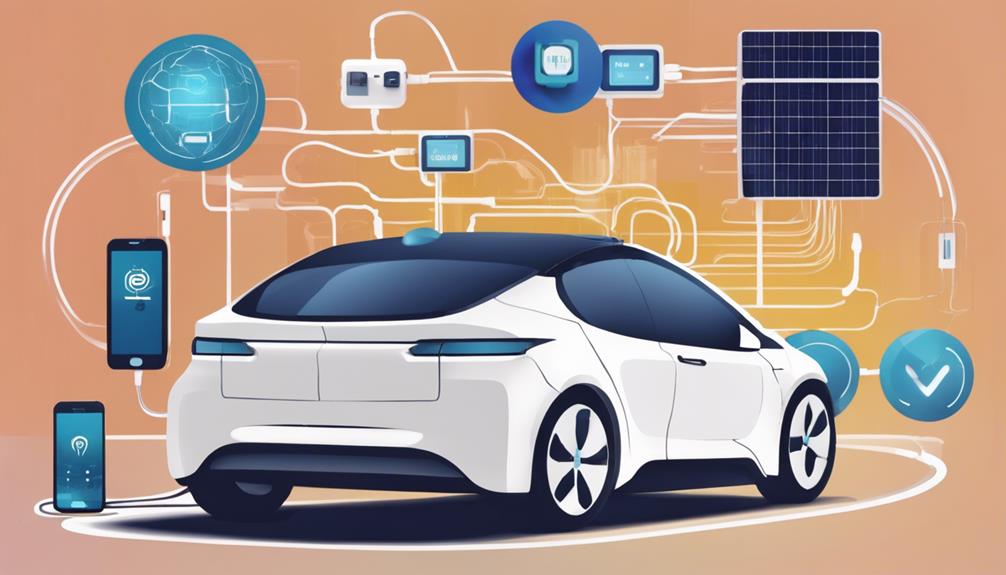
How does IoT technology enhance energy management in electric vehicles? Energy optimization, grid integration, and renewable integration play vital roles in maximizing the efficiency of electric vehicles through IoT technology. By leveraging real-time data analytics, IoT enables continuous monitoring and optimization of energy consumption, ensuring that resources are used efficiently. Smart charging systems, facilitated by IoT, streamline charging processes, reduce charging times, and enhance energy efficiency. Additionally, emphasis on renewable energy sources and dynamic load balancing is essential for sustainable energy management in electric vehicles. IoT enables the integration of renewable energy into the charging infrastructure, reducing reliance on non-renewable sources and minimizing environmental impact. Furthermore, dynamic load balancing techniques supported by IoT help distribute energy effectively across charging stations, optimizing the overall energy usage in electric vehicle operations. Through these advancements, IoT contributes significantly to enhancing energy management in electric vehicles by improving operational efficiencies and promoting sustainable practices.
Fleet Management
Fleet management efficiency greatly benefits from the integration of IoT technology for real-time monitoring and data-driven decision-making. With IoT sensors, fleet managers can optimize routes, monitor driver behavior, and track key performance indicators such as fuel consumption and maintenance needs. These insights enable informed decisions that lead to cost savings and operational efficiency improvements.
Route optimization plays an essential role in reducing fuel consumption and minimizing environmental impact. By leveraging IoT data, fleet managers can identify the most efficient routes, reducing unnecessary mileage and emissions. Additionally, monitoring driver behavior through IoT technology allows for the enhancement of safety protocols and the promotion of eco-friendly driving practices.
Personalized User Experience
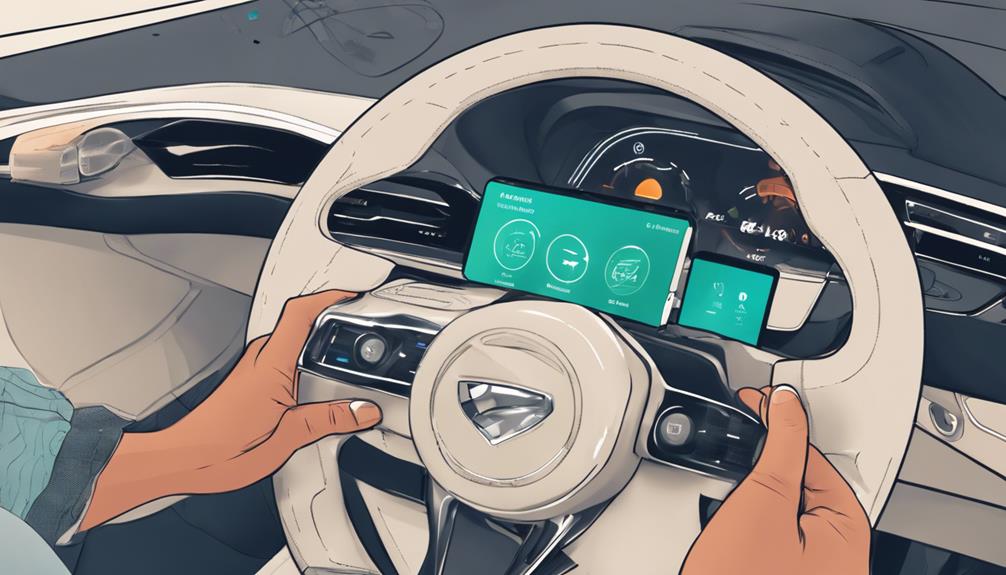
IoT technology revolutionizes the user experience for electric vehicle owners by offering personalized features such as tailored charging schedules and remote monitoring capabilities. Incorporating driver preferences into the charging process guarantees that your electric vehicle charges at the most convenient times for you, optimizing energy consumption and potentially leading to significant cost savings. By utilizing data-driven insights, EV owners can make informed decisions on when and how to charge their vehicles efficiently.
- Tailored charging schedules based on driver preferences
- Data-driven insights for optimizing charging times and energy consumption
- Remote monitoring and control capabilities for enhanced user experience
Through real-time notifications and alerts, you can stay updated on your EV's status and charging progress, empowering you with the information needed to manage your vehicle effectively. Personalized user interfaces in EV charging apps make navigation intuitive and provide customization options tailored to your preferences.
EV Charging Management
You're about to explore the essential aspects of Remote Charging Monitoring and the implementation of an Automated Billing System in the domain of EV Charging Management. These points play a key role in optimizing the efficiency and user experience of electric vehicle charging stations. By utilizing IoT technology, these features streamline operations, enhance security, and provide valuable insights for both station operators and EV owners.
Remote Charging Monitoring
Enhancing electric vehicle charging management through remote monitoring capabilities allows for real-time data collection on key operational metrics, such as voltage, electric current, and temperature. This enables efficient station operation and maintenance. With remote diagnostics, issues can be identified early, preventing potential downtime. Performance analytics offer insights into charging station efficiency, helping optimize the user experience and maintenance processes.
- Early Issue Identification: Remote monitoring facilitates quick detection of problems, enabling prompt maintenance and minimizing disruptions.
- Efficiency Optimization: Performance analytics provide valuable data on charging station performance, aiding in maximizing operational efficiency.
- Enhanced User Experience: Real-time data analysis leads to improved user satisfaction by ensuring reliable and convenient charging experiences.
Through IoT-powered platforms like MSTS.IoT, stakeholders can collaborate effectively, benefiting from intelligent maintenance practices and streamlined operations. Cloud-based solutions process data for actionable insights, catering to the growing demand for smart charging stations in the global market.
Automated Billing System
Implementing an automated billing system in EV charging management simplifies payment processes for users while ensuring accurate tracking of charging costs. By automating the billing process, users can easily make payments based on their actual usage, eliminating the need for manual calculations. The system tracks charging costs by considering energy consumption and time spent charging, providing transparent and detailed billing reports. This level of cost tracking not only benefits users but also enables service providers to analyze revenue streams effectively. Revenue transparency is enhanced through the automated system, boosting efficiency in managing finances related to EV charging services. Additionally, the data collected by the automated billing system can be utilized for in-depth analysis, aiding in making informed decisions for scalability and profitability of the EV charging infrastructure. Overall, implementing billing automation in EV charging management is pivotal for streamlining operations and ensuring a seamless payment experience for users.
Battery Management
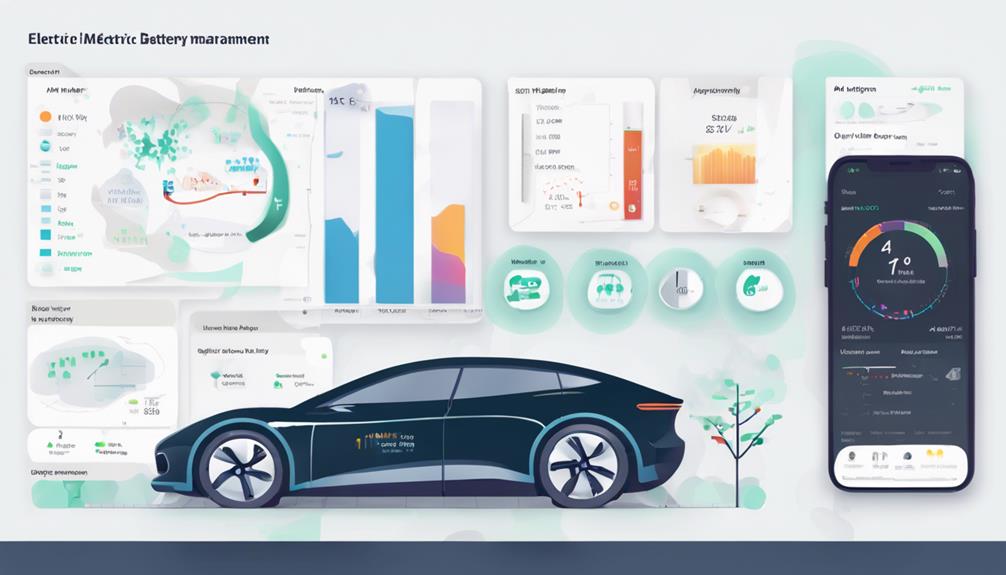
When it comes to battery management in electric vehicles, focusing on the State of Charge, Health Monitoring, and Charging Optimization is essential. Tracking the State of Charge guarantees efficient usage of the battery, while Health Monitoring helps in prolonging battery lifespan. Optimizing the charging process not only improves efficiency but also contributes to overall sustainability in the electric vehicle industry.
State of Charge
Effective battery management in electric vehicles relies heavily on the accurate monitoring and analysis of State of Charge (SOC) data. SOC calibration plays an essential role in determining the current battery capacity, allowing drivers to plan their journeys effectively and alleviate range anxiety. IoT technology facilitates real-time monitoring and reporting of SOC, enabling efficient battery management practices.
- Accurate SOC data optimizing charging processes
- Extends battery lifespan
- Improves overall vehicle performance
Precise SOC measurement not only aids in enhancing the driving experience but also contributes to predicting battery health and promoting EV adoption. Understanding the State of Charge is essential for maximizing the efficiency of electric vehicles, ensuring drivers can make informed decisions regarding their usage and charging habits. By leveraging SOC data effectively, electric vehicle owners can maintain battery health, prolonging the lifespan of their vehicles' power source.
Health Monitoring
Battery health monitoring plays a vital role in optimizing performance and extending the lifespan of electric vehicle batteries. By utilizing IoT systems for battery diagnostics, real-time data collection on battery temperature, charging cycles, and usage patterns becomes possible. This detailed information enhances battery management by preventing premature battery degradation and potential safety hazards. IoT-enabled battery health monitoring also allows for remote monitoring, enabling proactive maintenance and timely interventions to prevent failures. The precise monitoring of battery health metrics contributes greatly to efficient energy usage and sustainable EV operation. Through the continuous monitoring and analysis of battery health, performance optimization can be achieved, ensuring that electric vehicle batteries operate at their best capacity for an extended period. Battery health monitoring, powered by IoT technology, is essential for maintaining the health and efficiency of electric vehicle batteries.
Charging Optimization
Maximizing operational efficiency in electric vehicles relies heavily on the precise management of charging optimization through IoT technology. When it comes to charging optimization, IoT plays a pivotal role in enhancing the overall performance and sustainability of electric vehicles. Here are some key aspects to explore:
- Charging Efficiency: IoT enables monitoring and controlling the charging process, ensuring that electric vehicles are charged efficiently to maintain effectiveness and extend battery life.
- Smart Scheduling: Through IoT integration, electric vehicles can schedule charging during off-peak hours, reducing energy costs and minimizing the impact on peak demand periods.
- Energy Optimization: IoT-based battery management systems analyze data to optimize energy consumption, ensuring that electric vehicles operate efficiently while minimizing waste.
Enhanced User Experience
An integral aspect of IoT integration in electric vehicle charging is the optimization of user experience through real-time data access and personalized services. Enhanced user experience revolves around providing drivers with vital information such as charging station availability, energy consumption rates, and personalized notifications. IoT-powered applications play a pivotal role in empowering drivers to effortlessly locate nearby charging stations, reserve spots, and receive weather-related updates for efficient charging. This level of convenience extends to seamless access to charging points, remote monitoring capabilities, and automatic software updates, all contributing to an improved user experience. Moreover, IoT enables proactive maintenance, intelligent traffic management, and predictive analytics, ensuring smooth operations and heightened user satisfaction. By offering secure connectivity, real-time insights, and personalized services, IoT integration in EV charging notably enhances the overall user experience, making the shift to electric vehicles more seamless and enjoyable for drivers.
Increased Efficiency
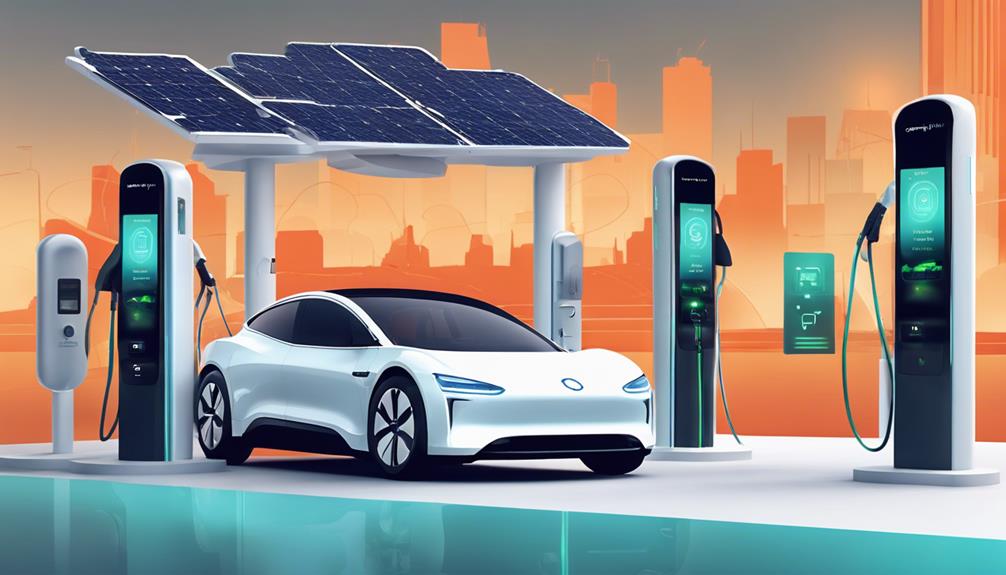
When it comes to increased efficiency in electric vehicles, data-driven optimization is essential. Real-time monitoring facilitated by IoT technology allows for precise tracking of battery performance and charging processes. Automated maintenance tracking further enhances efficiency by predicting and preventing potential issues before they occur.
Data-Driven Optimization
Enhancing electric vehicle efficiency through data-driven optimization involves analyzing real-time performance metrics to fine-tune operational parameters and maximize overall performance. By harnessing the power of data analytics, EVs can undergo performance optimization for increased efficiency. This process allows for:
- Predictive Maintenance: By predicting maintenance needs based on data analysis, EV owners can address issues proactively, preventing potential breakdowns and ensuring peak vehicle health.
- Optimized Charging Schedules: Through analyzing energy consumption patterns and charging infrastructure availability, EVs can create personalized charging schedules that minimize costs and maximize convenience.
- Route Planning: Utilizing driving patterns and real-time traffic data, EVs can optimize route planning to reduce energy consumption and travel time, enhancing the overall driving experience.
Data-driven optimization not only enhances the efficiency of electric vehicles but also paves the way for a more sustainable and environmentally friendly transportation ecosystem.
Real-Time Monitoring
Utilizing IoT for real-time monitoring in electric vehicles revolutionizes the tracking of key performance indicators, enabling proactive maintenance and optimized driving efficiency. Performance monitoring through real-time alerts allows for immediate access to essential data such as battery status, energy consumption, and vehicle diagnostics. This proactive approach to diagnostics not only guarantees the timely resolution of issues but also contributes to optimized efficiency during driving.
Automated Maintenance Tracking
Automated maintenance tracking in electric vehicles, facilitated by IoT systems, greatly enhances operational efficiency by proactively monitoring performance metrics and detecting issues early on. IoT-enabled sensors continuously gather real-time data on essential aspects such as battery health and vehicle diagnostics. This data is then analyzed to predict maintenance needs, enabling preemptive actions to prevent breakdowns and reduce repair costs. Key features of automated maintenance tracking in electric vehicles include:
- Maintenance alerts: Automated systems notify drivers and service centers about upcoming maintenance tasks, ensuring timely servicing and preventing unexpected failures.
- Fault detection: By constantly monitoring performance parameters, IoT systems can detect faults or abnormal behaviors in the vehicle's components, allowing for quick intervention before issues escalate.
- Predictive maintenance: Leveraging IoT analytics, predictive maintenance algorithms help identify potential problems before they occur, optimizing operational efficiency and prolonging the lifespan of electric vehicles.
Reduced Downtime
With IoT technology, minimizing unplanned downtime in electric vehicles becomes achievable through proactive maintenance and real-time monitoring. Reduced downtime is vital for maximizing operational efficiency and ensuring user satisfaction. By conducting thorough downtime analysis using IoT solutions, EV owners and operators can identify patterns, root causes, and recurring issues that lead to vehicle breakdowns. This data-driven approach allows for swift intervention, addressing potential problems before they escalate, thereby minimizing the impact of downtime on operations.
Operational efficiency is greatly enhanced through the implementation of IoT for electric vehicles. Real-time monitoring and predictive maintenance enable proactive measures to be taken, optimizing vehicle performance and reliability. By leveraging IoT solutions, EV owners can streamline maintenance processes, reduce repair costs, and improve overall availability. The ability to access real-time data analytics facilitates informed decision-making, ultimately leading to a more reliable and efficient electric vehicle fleet.
Frequently Asked Questions
Can Iot for Electric Vehicles Track Real-Time Driver Behavior?
Yes, IoT for electric vehicles can indeed track real-time driver behavior. Driver monitoring through IoT systems provides valuable insights for optimizing energy efficiency. For instance, by analyzing acceleration patterns, IoT can recommend driving adjustments to conserve energy. This real-time data collection not only enhances energy efficiency but also contributes to overall vehicle performance. IoT's ability to track driver behavior plays an essential role in maximizing efficiency and ensuring safe driving practices.
How Does Iot Technology Enhance EV Battery Lifespan?
To enhance EV battery lifespan, utilizing IoT technology is key. Battery maintenance is optimized through continuous performance monitoring. IoT enables real-time tracking of battery health indicators, ensuring timely interventions to prevent degradation. By leveraging data insights, charging processes can be tailored to reduce strain on the battery, extending its longevity. Predictive maintenance identifies potential issues early, safeguarding the battery and avoiding costly repairs. Efficient management and preservation of battery health are facilitated through IoT sensors.
What Security Measures Are in Place for Iot-Enabled Evs?
When it comes to security measures for IoT-enabled devices, data encryption plays a pivotal role in safeguarding sensitive information. Remote monitoring allows for real-time oversight, ensuring prompt responses to any potential threats. Cybersecurity protocols are in place to protect against unauthorized access, while vehicle authentication mechanisms add an extra layer of defense. These combined measures create a robust security framework for IoT-enabled devices, enhancing overall protection and data integrity.
Can Iot Predict Charging Station Availability for Evs?
Yes, IoT can predict charging station availability for EVs through advanced predictive analytics. By analyzing real-time data on charging infrastructure usage and traffic patterns, IoT systems can forecast station availability. These insights enable smart grid technologies to optimize energy optimization and charging schedules efficiently. By harnessing IoT capabilities, EV drivers can benefit from timely notifications about upcoming station availability based on historical usage patterns, enhancing their overall charging experience.
How Does Iot Improve EV Range Estimation Accuracy?
To enhance EV range estimation accuracy, IoT leverages data analytics and machine learning for predictive maintenance and energy optimization. Advanced algorithms continuously analyze real-time data on battery status, temperature, and energy consumption to refine range predictions. By considering variables like traffic, weather, and terrain, IoT tailors precise estimations for drivers. Energy management systems are optimized through IoT integration, dynamically adjusting power consumption to extend driving range.
